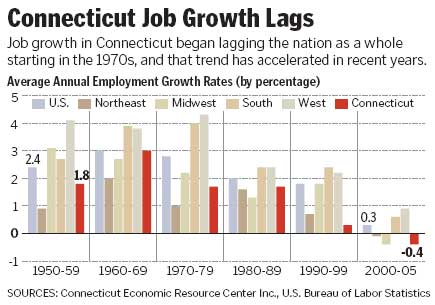 |
 |
|||
|
||||
| Web Sites, Documents and Articles >> Hartford Courant News Articles > | ||
|
State's Economy In Jeopardy, Report Says Economic Development Agency Cites Weak Schools, Dearth Of New Jobs As Big Problems December 1, 2006 Unless Connecticut cleans up its crumbling inner cities, improves its decaying educational system and promotes job creation, it faces a bleak economic future, according to a report released Thursday by the Connecticut Economic Resource Center Inc., a nonprofit economic development agency. "We have a Third World educational system in Hartford and Bridgeport," said Jeffrey W. Blodgett, CERC's vice president of research. "These are our future workers, and until we can affect that, we won't like the world of 2020."
"High school dropouts had a tough time in the old economy; in the new economy it's hopeless," Blodgett said. Manufacturing jobs that once served as a safety net for workers without sufficient educational skills have mostly disappeared. In some Connecticut cities, urban high school dropout rates are approaching 50 percent, the report said. Lacking education and well-paying jobs to support their families, the population of inner cities will face further hardships, requiring an even higher proportion of social services. "We can't afford to have a permanent underclass," Blodgett said. "Weak cities create a drain on the state's economy," said Diane Wishnafski, executive vice president of business and retail services of NewAlliance Bank. The report, Benchmarking Connecticut 2006, urges the state to dramatically improve the public school system. The business community can also play a role, creating programs to mentor students and provide internship opportunities, said Jana Moak, president and CEO of Control Module Inc. "If every company did that, reached out to the universities and the high schools - especially the high schools - that would help," Moak said. In a press conference Thursday at Northeast Utilities in Berlin, businesses that helped underwrite the report urged state policymakers to heed its contents. Although Connecticut's economic future is less certain than ever, it isn't alone in the problems it's facing, which include waning entrepreneurship and a rate of job creation that hasn't kept pace with national levels. All New England states are facing similar challenges. The report urges New England's policymakers to ignore state boundaries and work together as a region to entice businesses. As evidence, Blodgett cited the success of the Southern Growth Policies Board, which represents 13 southern states and Puerto Rico. To promote economic development, the board promotes cooperation between government, businesses and academic leaders. Its efforts may be one reason the South has continued to make consistent annual gains in employment. "Tunnel vision won't cut it," said Robert Tannenwald, vice president and director of the New England Public Policy Center at the Federal Reserve Bank of Boston. "The New England states can do so much better as a whole in terms of affecting transportation, energy distribution and health care." Other factors that may contribute to the lagging rate of job creation are related to the state's sluggish entrepreneurial climate. According to the report, Connecticut ranked 48th among the best states for entrepreneurs in 2006, down from 43rd in 2005. "Here in Connecticut, the data seems to show that we're not creating jobs, we're not seeing people move into the state to create jobs," said R. Michael Goman, president and CEO of Konover Development Corp. The remedy, Goman said, isn't rocket science: Make it simple for businesses to invest in our state. Speed is of the essence: "People can't wait three or four years for a return." And above all, make it certain - "If I meet all the rules and regulations, then I can open my business in your state," Goman said. Key legislators were invited to Thursday's presentation and Goman questioned their absence. "I think it's shameful that we have, I think, only one legislator in the room, and that's a tragedy. We all ought to go back our office and call them and berate them for not being here today." Connecticut's demographic profile isn't promising. An aging population coupled with the continuing out-migration of young, college-educated professionals represent a substantial brain drain. And the growing shortage of affordable housing is making some companies think twice about relocating here. If their employees can't find affordable housing here, they're not going to want to relocate, the report said. And yet, the business leaders agreed, the future need not be bleak. The hobgoblin of defeat is complacency. The business community and policymakers need to roll up their sleeves and take action. "This is a state that is really characterized by complacency," said Bruce Katz, vice president of the Brookings Institution. Unless Connecticut addresses its deficits - a failing educational system and inner city blight - and promotes a business climate steeped in innovation the state faces an uncertain economic future, the report concluded. The full report can be downloaded from www.cerc.com/benchmarks.
|
||
| Last update:
September 25, 2012 |
|
||
|

